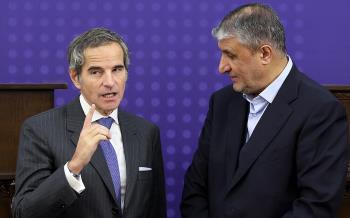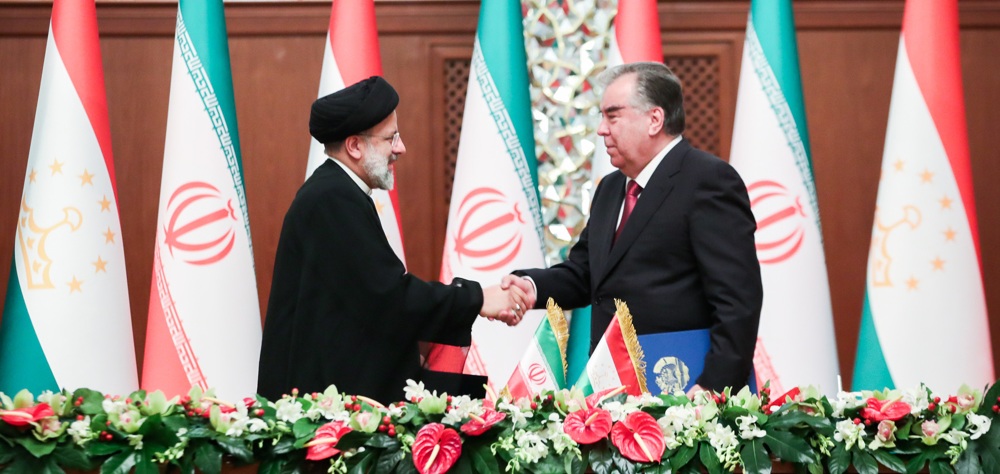Alwaght- The first foreign trip of the new Iranian President Sayyed Ibrahim Raeisi turned into one of most marked diplomatic events of the Islamic Republic's foreign policy in 40 years. During Raeisi's trip to Tajikistan, Iran was officially approved a member of the Shanghai Cooperation Organization (SCO) after long wait. The trip also made way for very important bilateral meetings with other countries' high-ranking officials, promising a fruitful foreign policy under President Raeisi. Here are the most important achievements of the trip:
Iranian accession to SCO
Although the Iranian president's visit to Dushanbe was also aimed at holding diplomatic meetings, without a doubt the most important achievement of this trip was official approval of Iran as a permanent member of the bloc after 16 years of waiting as observer member.
On April 26, 1996, the leaders of China, Russia, Kazakhstan, Kyrgyzstan, and Tajikistan met in Shanghai, China for "Shanghai 5" meeting. After five meetings, in 2001 they officially announced SCO foundation. With the new bloc rapidly gaining a position in the Central Asian equations, Iran bid for its membership. In 2005, Tehran was declared an observer member.
Since 2005, Iran has been a subject of official membership discussion. Up to July 2015 and before Iran nuclear deal was signed between Tehran and the five powers, the international sanctions and UN Security Council resolutions established legal and political obstacles blocking Iran membership. In 2017, because of Tajikistan disagreement for so-called security and political reasons, despite agreement of all other member states, Iran's bid went nowhere. However, at the recent summit, Tajikistan gave a green light.
Finally on Thursday, the bloc approved Iran's permanent membership, ending 16-year wait. Many political observers now believe that the finalization of Iran's permanent membership in the organization will bring great achievements and potentials to the Islamic Republic. Russian ambassador to Iran Levan Dzhagaryan considered the beginning of the process of Iran's permanent membership as the first foreign policy success of President Raeisi and Foreign Minister Hussein Amir-Abdollahian. Amir-Abdollahian has stated recently that the effects of Iran's permanent membership will be visible in the economic program of the Raeisi's administration.
Special emphasis on Tehran-Dushanbe cultural cooperation boost
In addition to the SCO membership, another achievement was high-level agreements between Iran and Tajikistan. Cultural cooperation expansion is, undoubtedly, the main missing link in the relations of the two Persian-language countries. Ayatollah Raeisi at a joint meeting of high-level delegations of Iran and Tajikistan addressed his Tajik counterpart Emomali Rahmon, stating that relations between the two nations rely on common and several-thousand-year deep-rooted and deeply friendly religion, culture, language and history.
"I hope that my visit to Tajikistan, which is my first foreign trip as president of Iran, will be a turning point and open new chapter in the comprehensive cooperation between Tehran and Dushanbe," he said.
During the meeting, the Tajik president described the Iranian President's visit" historic" and said: "The common language, values, culture, and history of the people of Iran and Tajikistan is an important factor in facilitating the bolstered relations between the two countries."
Special economic planning focusing on $500 million trade
Boosting economic cooperation is another gain of the Iranian president's Tajikistan visit. Welcoming the proposal of the president of Tajikistan to increase the volume of trade and transfer of technical and engineering achievements of the Iranian private sector, President Raeisi said: "I agree with you about the need for a task force meant to address the past agreements to see why they were not implemented or implemented slowly in order to remove the obstacles. The level of the two countries' trade is unacceptably low and we need to maximize it as much as possible.
Raeisi stated that the expansion of relations with the countries of the region and neighbors is a priority of the foreign policy of the Islamic Republic in the new era, adding that Iran has expanded its capacities and facilities in the field of transportation and access to high seas to develop cooperation and relations with friendly and neighboring countries, and the activation of these capacities can play an effective role in deepening friendship and strengthening Iran's interactions with regional states.
Pointing to 160 bilateral cooperation documents signed by the two sides in past years, Rahmon said: "Unfortunately, bilateral trade volume dropped to $57 million annually, but with regard to the existing capacities and continued contacts, meetings, and talks of officials from both countries, we can target $500 million."
He hoped that the roadmap for trade exchange boost will be finalized as soon as possible and that they will be able to pursue the implementation of its goals more quickly by forming a joint investment council and specialized institutions. Referring to the privileged position and capacities of Chabahar and Bandar Abbas ports of Iran, Rahmon said Tajikistan was seriously interested in using the two Iranian ports via railway and road." He also called for establishing regular direct flights between the two countries, Iran participating in oil and gas exploration in Tajikistan, shoring up scientific and cultural cooperation, and developing tourism.
Uplift to Iran political and diplomatic position in the region
Another achievement is political. There were meetings with delegations from other countries. President Raeisi met Turkmenistan President Gurbanguly BerdiMuhamedow and Armenian Prime Minister Nikol Pashinyan. He also participated at a meeting of the Collective Security Treaty Organization (CSTO). His Foreign Minister Amir-Abdollahian joined Russian, Chinese, and Pakistani counterparts at a quartet meeting. Mr Amir-Abdollahian also held separate meetings with Russian and Chinese counterparts.
The Tajikistan trip was of extraordinary significance to improvement of relations with Iran's northern neighbors. Highlighting the importance of President Raeisi's visit to Tajikistan, Amir-Abdollahian asserted that the visit carried "very good" message to all neighboring countries, and "specifically for our northern neighbors."
Iran-Tajikistan convergence of stances on Afghanistan
The two countries said they held shared views on Afghanistan political developments. During the meeting with Tajiki counterpart, the Iranian president referred to Afghanistan saying that the only way out of current crisis is formation of an inclusive government and away from foreign interference.
"Afghanistan should be administrated by the Afghans and no foreign country should interfere," he said.
Rahmon responded by saying that the future Afghanistan government should be formed with participation of all groups and sects, protect rights of all Afghans, and the UN should effectively supervise this process. "No foreign country should interfere in Afghanistan affairs," he went on.
Before this meeting, Amir-Abdollahian had talked to his Tajik counterpart Sirojiddin Muhroddin, insisting that a fully inclusive government representing Tajiks, Pashtuns, Hazaras and other ethno-sectarian groups was the only way back to calm, stability, and development. The Tajik FM agreed with the inclusiveness of new government in Afghanistan and highlighted the need for humanitarian aids to the Central Asian country.
Given the meetings and discussions of the Iranian officials in Tajikistan, the trip made important achievements for Iran's "pivot to the East" foreign policy, broader relations with neighbors, and demonstration of Iran's resolve to prioritize regional trade and partnership with neighbors to meet regional challenges.



























